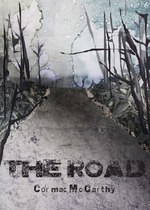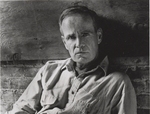But Is It Horror? A Critical Re-Examination of Genre in Cormac McCarthy's 'The Road'
By, Nicholas Kaufmann
Trying to define a genre by its tropes is always risky business. Take our hirsute friend the werewolf as an example. This iconic monster, at one time an instantly recognizable marker of the horror genre, today finds itself equally at home in fantasy (J.K. Rowling, Patricia McKillip and Terry Pratchett are just a few of the fantasy authors who have made use of werewolves) and romance (whose paranormal subgenre frequently makes use of lycanthropy). Within the past twenty years, such vast, overlapping gray areas have opened between the three sister genres of speculative fiction – science fiction, fantasy and horror – that those looking to fit a particular novel snugly into a single category must now look beyond the familiar genre iconography to something less easy to identify: tone. That is, the intent behind the use of that iconography. For horror, this is especially so. To paraphrase Douglas Winter's famous speech as toastmaster of the Bram Stoker Awards in 1998, horror can only truly be defined by the emotions a work of literature elicits. The genre's tropes – monsters, old dark houses, ghosts – can no longer play an active role in its definition because they can be just as easily found elsewhere.
While at their basest levels science fiction and fantasy can often be defined by setting – the future, non-terrestrial milieux, alternate history, magical kingdoms, etc. – horror cannot do the same. Instead, horror must rely on tone and intent to identify itself. On the one hand, this makes the genre one of the most inclusive. On the other, it also makes it the most difficult to define. Horror's tentacles can and do envelope everything from bloodthirsty demons to club-hopping vampires to stories with a complete lack of supernatural element, such as the serial killer subgenre (a category also claimed by the mystery and thriller genres — just another indication of how many gray areas exist when talking about genre in general, and horror in particular).
 Cormac McCarthy's Pulitzer Prize-winning 2006 novel The Road presents a particular genre conundrum. This ugly, brutal and tragic tale of post-apocalyptic America, where an unnamed man and his son travel a deserted road in search of safety from both the elements and from other survivors, many of whom have banded together to form roaming cannibalistic tribes, is claimed in equal measure by readers of horror, science fiction and literary fiction. But with horror readers in particular there seems to be some controversy as to whether The Road fits the genre bill. It's true that father and son's journey is punctuated by jarring moments of threat and grotesquerie – a cellar filled with chained, half-dead people being kept as livestock, the corpse of a baby roasting on a spit, to name two of the novel's bravura terror scenes – but is that enough to call The Road a horror novel?
Cormac McCarthy's Pulitzer Prize-winning 2006 novel The Road presents a particular genre conundrum. This ugly, brutal and tragic tale of post-apocalyptic America, where an unnamed man and his son travel a deserted road in search of safety from both the elements and from other survivors, many of whom have banded together to form roaming cannibalistic tribes, is claimed in equal measure by readers of horror, science fiction and literary fiction. But with horror readers in particular there seems to be some controversy as to whether The Road fits the genre bill. It's true that father and son's journey is punctuated by jarring moments of threat and grotesquerie – a cellar filled with chained, half-dead people being kept as livestock, the corpse of a baby roasting on a spit, to name two of the novel's bravura terror scenes – but is that enough to call The Road a horror novel?
Asking several leading authors in the genre, as well as perusing related reviews and articles, leads to some interesting, and differing, viewpoints.
"To me, horror is about a certain emotional response," says Bram Stoker Award finalist Nate Kenyon (Bloodstone), echoing Winter's definition. "Reading The Road made me feel equally unsettled, disgusted, terrified and alone. It also made me think long and hard about humanity in the face of devastation and survival against insurmountable odds. I hate to pigeonhole anything into one particular genre, but if I had to file The Road on the shelves, I would put it squarely under horror."
So would Pulitzer Prize winner Michael Chabon (The Yiddish Policeman's Union). In his review of The Road for The New York Review of Books, Chabon writes, "The end of the world...has long been a temptation as appealing to writers of horror fiction as to those of science fiction. Poe sent a fiery comet to do the job in 'The Conversation of Eiros and Charmion.' Richard Matheson, in his novel I Am Legend, sent a bacterial plague that induces vampirism, and in The Stand Matheson's greatest disciple, Stephen King, wiped out humanity with the superflu known as Captain Trips. And I think ultimately it is as a lyrical epic of horror that The Road is best understood." He goes on to explain, "Horror fiction proceeds, in general, by extending metaphors, by figuring human fears of mortality, corruption, and the loss of self.... [The Road] trade[s] on these deep-seated fears, these fundamental sources of panic, and seek[s] to flay them, to lay them open, to drag them into the light."
Literary critic and Stoker-winning author Michael Marano (Dawn Song) compares The Road almost to the cosmic, unknowable terror found in Lovecraft or Machen. "Yeah, The Road is horror," Marano says. "Like Blood Meridian and even No Country For Old Men, it's McCarthy's attempt to lock horns with the sublime in way that's supposed to inspire fear. McCarthy riffs on Kant and Kant's notions of the sublime, which are all about the fear of that which is so terrible, you can only barely grasp it. Blood Meridian in particular, as a mediation on Moby Dick through the lens of a uniquely American savagery, kind of mediates on Kant the same way that Unca Herman mediates on whales. The Road is also a mediation on a uniquely American savagery, and it's a bookend to Blood Meridian; Blood Meridian is about the savagery of the start of the American Empire, The Road is about the savagery of its death rattle-y end. Blood Meridian's Judge Holden, No Country for Old Men's Anton Chigurh and the tribes of cannibals in The Road are figures of horror in that they're blanks — Monsters of Absence, like Popeye in Faulkner's Sanctuary and Hannibal Lecter, before he became a cartoon. As blanks, you feel Kantian awe and terror as you stare into that emptiness, in the same way Kant described 'amazement bordering on terror, by horror and a sacred thrill' when you stare at a vast mountain range."
However, Stoker winner and filmmaker Lisa Morton (A Halowe'en Anthology) uses Winter's criteria of authorial intent as a reason not to consider The Road a horror novel. "Was McCarthy's primary intent to scare us, horrify us? I'd argue no (by the way, considering how much time he doesn't spend on the science, I think you can likewise argue that it's not a science fiction novel — the post-apocalyptic setting is almost presented in a fantasy way, with no cause or technology clearly behind it). An adventure or quest story? Perhaps. A character study? I think that's likeliest. But tossing in a few cannibals that the protagonists have to face doesn't make it a horror story; even the inclusion of those (mild) horror elements exist to give the heroes something to fight against, not to horrify the reader."
Morton is hardly the lone dissenter. A kind of backlash against The Road exists not just within the horror genre but also within science fiction. The novel was broadly reviewed in organs serving both genres and, tellingly, was often given poor marks due to its near plotless structure and an oft-stated disappointment that it brought nothing new to the post-apocalyptic table. Unfortunately, one can't help noticing an almost territorial sentiment in some of these reviews, as if post-apocalyptic fiction were solely the domain of dedicated genre practitioners and no high-falutin' literary author ought to be able to make his mark on it. This attitude is perhaps best exemplified by a review at SciFi Dimensions that warns genre fans not to get too excited over The Road's Pulitzer win because "[t]rue vindication for the genre (if such is desired) will only come when the Pulitzer goes to an openly shelved science fiction novel whose author is a self-professing, credentialed science fiction writer."
While The Road received recommendations for both the HWA's Bram Stoker Award and the SFWA's Hugo Award, it was a finalist for neither. Nor was it shortlisted for the Nebulas or the International Horror Guild Awards. It was, however, a Pulitzer Prize winner, a National Book Critics Circle Award finalist, a New York Times notable book, and was named one of the best books of the year by a dozen newspapers and magazines. If genre were defined solely by where a book is most accepted, The Road could handily shake off any claims by horror and science fiction readers and rest easy in the arms of literary fiction.
 Luckily, that's not the case. Genre, after all, is ultimately little more than a marketing tool used by publishers and booksellers, and indeed horror itself did not even exist as a genre category until roughly thirty years ago. That The Road is not shelved in the horror section, and that McCarthy is not marketed as a horror author, makes little difference as to whether the novel can be defined as horror under Winter's widely accepted definition. Nor does the fact that The Road is considered literary fiction – itself a relatively new marketing category – alter this assessment, since literary authors working with genre elements is hardly something new. A recent interview with Chabon and World Fantasy Award-winning author Jeffrey Ford on Media Bistro's GalleyCat blog addresses this very issue:
Luckily, that's not the case. Genre, after all, is ultimately little more than a marketing tool used by publishers and booksellers, and indeed horror itself did not even exist as a genre category until roughly thirty years ago. That The Road is not shelved in the horror section, and that McCarthy is not marketed as a horror author, makes little difference as to whether the novel can be defined as horror under Winter's widely accepted definition. Nor does the fact that The Road is considered literary fiction – itself a relatively new marketing category – alter this assessment, since literary authors working with genre elements is hardly something new. A recent interview with Chabon and World Fantasy Award-winning author Jeffrey Ford on Media Bistro's GalleyCat blog addresses this very issue:
"When [Ford] was the same age Chabon was when he went to grad school, he reflected, writers like Thomas Pynchon, Robert Coover, John Barth, and 'the South American guys'...were working fantastic elements into their fiction all the time. Chabon pointed out that the idea that writers would only work within one genre is a relatively new one; look at the range of stories Edgar Allan Poe or Rudyard Kipling told, for example, or Isaac Bashevis Singer. 'Singer is unquestionably recognized as a literary writer,' Chabon explained, 'but is also as much a part of the supernatural literary tradition as Poe.'...'I don't know why it's such a big deal,' Ford said of the genre-straddling, to which Chabon replied, 'The people it matters the least to are the ones who are doing it. In so many other artistic mediums, it's not weird at all.'"
One such author it doesn't matter to is McCarthy himself, who shows little interest in analyzing The Road's genre elements. "I like to think it's just about the boy and the man on the road," the author said in an interview on Oprah, "but obviously you can draw conclusions about all sorts of things from reading the book depending on your taste."
So is The Road a horror novel? If we use Winter's definition that horror is characterized by the emotions it elicits in the reader, The Road, with its pervasive sense of dread, is very much a horror novel. That it can also be viewed with equal validity as science fiction and literary fiction doesn't lessen its connection to the horror genre at all. The truth is that strict genre adherence is becoming less and less important to many of today's best writers, and by extension less important to their readers. As a result of this, the gray areas between genres are expanding to the point where they are almost as big as the genres themselves. Though genre trappings in literary fiction are nothing new, we're seeing more of it now than ever before. The Road happens to be one of the best examples of this, the culmination of a genre-spiced stew that has been simmering on literary fiction's stove for a long time. It is a novel that is more than worthy of acceptance as a horror novel (and, in this critic's opinion, more than worthy of the genre awards that so myopically overlooked it).
"The Road, with its relentless, bleak post-apocalyptic setting complete with roving bands of cannibals, asks of its father and son characters, 'Okay. So what next? What are you going to do now?'" says Stoker finalist Paul G. Tremblay (The Little Sleep). "If that isn't horror, I don't know what is."




